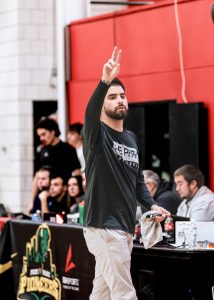Scientists in South Africa discover new COVID-19 variant Omicron
December 1, 2021
On November 23, scientists in South Africa discovered a new coronavirus variant that has been designated “Omicron” by the World Health Organization (WHO). The variant, officially known as B.1.1.529, has confirmed cases in 16 different countries, including the United Kingdom and Canada as of Monday, Nov. 29.
“What I understand is that there are somewhere in the area of 30 different mutations in this variant as opposed to Delta, which only had 10,” Doctor Laura Frost, a professor of biological sciences, said. “We don’t know what that means yet for the antibodies that have already been generated against the natural infection with the other strains and how the antibodies protect against the new variant.”
In a press conference on Monday, President Biden formally addressed concerns over the discovery of the variant, suggesting citizens should be cautious of the new variant, but should not panic, which was also a sentiment shared by Doctor Frost.
“It’s a little concerning, but I don’t think it should mean panic or alarm yet until the people doing the science have time to not only run the sequences, but to then to look at the antigenic sequences to see if those antibodies cross protect,” she said.
The discovery of the Omicron variant comes as students returned to campus following Thanksgiving Break. Last year, due to the pandemic, students were given the option to not return to campus in between Thanksgiving Break and Winter Break, an option which some students think should have continued this year.
“I do not think the university should have had us come back,” Kayla Prevost, a psychology major, said. “We have so many students from all sorts of different states and places that coming back is just setting us up to get sick. I wouldn’t be as worried with the new variant if we didn’t come back.”
Currently, the university has remained focused on ensuring students and faculty continue to follow the masking policy that was implemented at the beginning of the semester. Dean of Students Keith Paylo sent an email to the student body on Monday with a reminder that the university has not dropped its mask mandate.
“We’re gonna just reiterate masking, we’re already doing everything the CDC has recommended for all the procedures and staying safe,” Student Government Association (SGA) President Dennis McDermott said. “We’re trying to double down on getting people masked up and making sure people are staying masked up because compliance has been low in certain areas on campus.”
“We will continue with all current safety measures and will follow local, state and federal guidelines, as well as the recommendations of our health partners at UPMC,” Managing Director of University Marketing and Public Relations Lou Corsaro said. “As of now, we are not requiring booster shots.”
The Center for Disease Control and Prevention (CDC) is encouraging fully vaccinated adults to receive booster shots six months after their first dose, as well as continuing to wear masks in areas with high transmission rates.
“If you reacted well to the first two shots, a booster shot should definitely be on your mind. Three exposures provides a real boost to immunity,” Frost said. “I’m really curious. I think in the next two weeks to two months or so, we should have more information on antibodies from the vaccines and natural exposure … which is obviously too late because the travel from the holidays will have happened.”
Last year, following the holiday season, the United States saw one of the largest spikes in COVID-19 cases of the entire pandemic. While other countries have announced both lockdowns and partial lockdowns, President Joe Biden stated there is no current plan to shutdown the country during the rise of Omicron but established travel restrictions for entry into the United States from eight countries in Africa based on noncitizen status.
“I don’t think [a lockdown] will happen again, unless this new variant is not only more highly transmissible but far far more varialant,” Frost said. “I don’t think the population will tolerate another full on lockdown. I really think that’s a remote possibility.”
The coronavirus was first declared a pandemic by the World Health Organization on March 11, 2020. It is currently unknown when the global pandemic could be declared over.
“I want to say yes we get to that magic threshold of people who have been inoculated and are immune and then this begins to subside, but I have a really hard time saying that with conviction simply because this virus seems to mutate very rapidly,” Frost said. “It just seems like the variations that it can produce have the capacity to evade our immune system and then essentially every exposure to a new variant is like a new virus to your immune system, so the memory doesn’t protect any longer. As much as I’d like to say yes, we will vaccinate, we will get to a point where we have that threshold of immunity that the virus can’t sustain itself in the population any longer, it’s really hard to say that with any degree of conviction given how rapidly this virus mutates.”


















